
Dir/Wri: Rob Stewart | Doc | 88′
Did you ever feel sorry for a shark? You will after watching Sharkwater Extinction. This follow-up to the acclaimed 2006 documentary Sharkwater, is a powerful and persuasive film that pleads us to ponder the fate of sharks. Asian nations are now the main predator of the mostly docile creatures due to the extensive popularity of shark fin soup which is driving a cruel and illegal trade in their body parts.
In the opening scenes we see a man holding a freshly caught baby bluefin shark and then cutting its dorsal fin and re-releasing to certain death in the water. As Woody Allen once said, “a relationship is like a shark, if it doesn’t move forward, it dies” and that – joking apart – is the essence of Stewart’s film.
Director, writer and conservationist Rob Stewart dedicated his life to raise awareness of this eco-issue. His documentary serves both as a heads-up for their continuing plight and a gorgeous-looking cinematic tribute to his own efforts to bring it to our attention. Rob lost his life in 2017 at 37 in a diving accident while working on what would have been his third and final film.
“I met my first shark when I was 9,” Stewart tells us proudly, and from then on it was more or less a love story about this amazing breed of fish that makes a vast and important contribution to the ecosystem. It soon emerges that a small loophole in the system allows shark-fingers to transfer their booty (often worth billions) to refrigerated container vessels which are not checked for cargo contents. One of the film’s most sobering statistics is that the shark population has dropped 90 percent in the last 30 years.
Rob Stewart takes us on a global journey to visit points of exploitation: Panama, Costa Rica, Cape Verde and shamefully even the Californian coast and Miami Florida where one fisherman rejects the idea that sharks are endangered. But we see with our own eyes shark carcasses being loading into vast vessels. Meanwhile, Stewart and his collaborators secretly film fishermen in Catalina whose drag nets are illegally trapping and drowning the animals. Shots are fired and they quickly make it to safety. Clearly this lucrative trade is well-protected.
It also emerges that many of the fish products available in the supermarket contain shark. Over thirty percent of pet foods tested positive for shark, and they’re also found in fertilisers, livestock feed and even beauty products. “We’re smearing endangered super-predators on our faces without knowing it,” comes Rob’s ironic observation.
The last laugh is on the predators themselves though. It turns out that shark is a dangerous food to eat. Due to their age, and diet, the fish themselves contain large amounts of mercury and other toxic elements which will be far more concentrated in the body parts.
Made on the hoof, the marine underwater scenes are absolutely breathtaking and we get to see some of the World’s largest seaports. By the end we really feel for these animals and their plight as we experience, up close and personal, their dying throes as they are caught in nets or bump startled to the bottom of the seabed and die, completely unable to navigate.
The final scenes are ominous but really tragic to behold as we see the title “The Last Dive” appearing on the screen. It then transpires that Rob lost his life trying to share with us images of sawfish sharks. His film is a revelation of a life well-lived. More people die from falling in their slippers than being eaten by sharks. But after watching this you will no longer fear them. MT
NATIONWIDE FROM 22 MARCH 2019